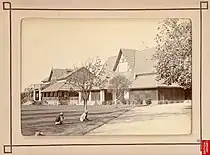Gymkhana
Gymkhana (/ˈdʒɪmˈkɑːnə/) (Urdu: جِم خانہ, Sindhi: جمخانه, Hindi: जिमख़ाना, Assamese: জিমখানা, Bengali: জিমখানা) is a British Raj term which originally referred to a place of assembly. The meaning then altered to denote a place where skill-based contests were held. "Gymkhana" is an Anglo-Indian expression, which is derived from the Persian word "Jamat-khana".[1] Most gymkhanas have a Gymkhana Club associated with them, a term coined during the British Raj for gentlemen's club.

More generally, gymkhana refers to a social and sporting club in the Indian subcontinent, and in other Asian countries including Malaysia, Thailand, Burma, and Singapore, as well as in East Africa.
Etymology

The first element of Gymkhana comes from gend meaning ball in Hindi/Hindustani/Khariboli.[2] This element is distinct from the English word gym, short for gymnasium and gymnastics which has Greek and Latin roots.[3] The second element, khānā has a Persian origin, meaning a home or a compartment. In Persian, (خانه) is a term for dwelling, house.[4] The court language of the Mughal Empire was Persian.
See also
- List of India's gentlemen's clubs
- Hindu Gymkhana
- Bombay Gymkhana, Mumbai
- Deccan Gymkhana, Pune
- Delhi Gymkhana, Delhi
- Golaghat Gymkhana, Assam
- Madras Gymkhana Club, Chennai
- Gymkhana Ground, Rangoon, Myanmar
- Jamalpur Gymkhana, Bihar
- Jorhat Gymkhana Club, Assam
- Karachi Gymkhana Club, Pakistan
- Lahore Gymkhana Club, Pakistan
- Nairobi Gymkhana Club, Kenya
References
- MacMillan, Michael (1895). The Globe Trotter in India Two Hundred Years Ago: And Other Indian Studies. S. Sonnenschein & Company. p. 91.
- Parekh, Rauf (5 July 2021). "Origin of 'gymkhana' and 'kanjee house'". DAWN.COM. Retrieved 3 August 2021.
- Oxford Dictionaries Gymnasium etymology
- From Loghat'nāmeh-ye Dehkhoda, Third Edition (Tehran University Press, 2006), quoted from Borhān-e Ghāte' by Mohammad Moin.
Further reading
- "Sports of West Bengal — Cricket". wbsportsandyouth.gov.in. Kolkata: Government of West Bengal – Department of youth services and sports. 2017. Archived from the original on 9 July 2022. Retrieved 25 January 2023.
External links
 Texts on Wikisource:
Texts on Wikisource:
- "Gymkhana". New International Encyclopedia. 1905.
- "Gymkhana". Encyclopædia Britannica (11th ed.). 1911.